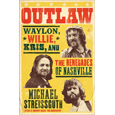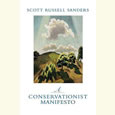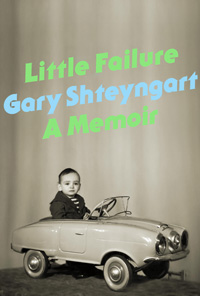Welcome to Your New Eden
Bruce Holsinger discusses The Displacements, a novel of natural disaster
Bruce Holsinger’s The Displacements, which depicts the social upheaval caused by America’s first Category Six hurricane, is a big-hearted novel that embraces a broad swath of people whose lives are levelled by natural disaster. For all of their differences in socioeconomic status, these characters learn that their survival requires cooperation.
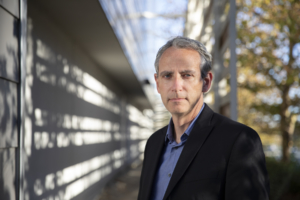
No Pollyanna, Holsinger knows that in a catastrophe not everyone rises above factional discord, but enough do so that they can formulate clever solutions to immediate problems and forge new alliances. After fleeing from their homes in South Florida and East Texas (both Miami and Houston are destroyed by flooding), these characters must learn, above all, not to let perfect become the enemy of good. Sometimes, as one character puts it, the best one can do is simply “muddle through” the swamp of trouble. “Maybe muddling through is underrated. Because that’s basically what the future is now,” he thinks, “a near future of muddling through with your people close around you.”
The family at the center of Holsinger’s novel — Daphne Larsen-Hall and her children and mother-in-law — suffer a steep downfall, from a luxurious home in a gated Miami neighborhood to scrounging for meals. When Daphne’s husband, a successful doctor, goes missing amid the chaos, Daphne must focus on the necessities — shelter, food, safety — while trying to protect her family from racial violence, drug dealers, and thieves. Her stepson Gavin reflects, ruefully, “Welcome to your new Eden.”
Holsinger, a professor of medieval literature at the University of Virginia and the author of three previous novels, recently answered questions from Chapter 16 via email.
Chapter 16: Prior to the disaster, the central family in The Displacements enjoys a privileged existence in Coral Gables, but after the storm drives them to a “megashelter” in Oklahoma they learn that their sense of security is based on illusions. What makes their story broadly representative?
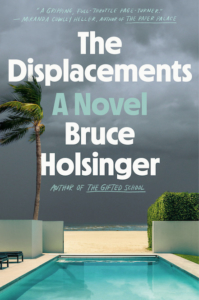 Bruce Holsinger: I wanted to depict the family’s story as both unique and representative: unique in that their family is affluent and yet ends up in a megashelter, representative in that every family in the world will soon enough be profoundly affected by climate change (as indeed tens of millions of families already have been). The challenges met by Daphne and her family are intimate, everyday, domestic. But they reflect the larger forces shaping our moment in history, and facing all of us at some level. We can’t ignore the fact that climate change will continue to have an enormously disproportionate effect on the poor and vulnerable.
Bruce Holsinger: I wanted to depict the family’s story as both unique and representative: unique in that their family is affluent and yet ends up in a megashelter, representative in that every family in the world will soon enough be profoundly affected by climate change (as indeed tens of millions of families already have been). The challenges met by Daphne and her family are intimate, everyday, domestic. But they reflect the larger forces shaping our moment in history, and facing all of us at some level. We can’t ignore the fact that climate change will continue to have an enormously disproportionate effect on the poor and vulnerable.
But more and more we’re seeing its growing impacts on the comfortable and prosperous, too. To paraphrase one of Daphne’s observations in the novel, climate change is coming for all of us. And yet as she and others in the megashelter show, resilience is a powerful tool for coping with catastrophes like this. As people who work with disaster victims have demonstrated time and again, humans have a great capacity to bounce back after even some of the worst setbacks, and in The Displacements I tried to show some of the ways these characters responded in caring and generous ways to the suffering of others even as their lives were being torn apart.
Chapter 16: If a single word can encapsulate the themes of this novel, it’s precarity, which you use halfway through the novel. That word captures the vulnerability of many of the characters, some who are unaware of their perilous circumstances. How do issues surrounding material precariousness drive the story of The Displacements?
Holsinger: Precarity is such a powerful word, speaking to so many elements of social and economic vulnerability: the precarity of the hungry with respect to food, the precarity of the displaced with respect to shelter, the precarity of part-time or contract workers with respect to their employment. It’s a key word in the critique of the university right now, which employs so many adjunct workers on a per-course basis, putting them in a precarious situation in comparison to full-time faculty. In the novel I wanted to explore the problem of security vs. precarity through the lens of one (seemingly) affluent family. The narrative takes them from security and privilege to precarity quickly, almost violently. I imagine the novel as an exercise in acceleration, showing this downward slope into precarity as part of the book’s narrative propulsion.
Chapter 16: One of the younger characters, Mia, learns in school that to overcome racist attitudes privileged individuals must “do the work” to understand others’ experiences. What role do you think literature can play in helping to bridge the chasm of mutual incomprehension?
Holsinger: I do think that literature is crucial in gaining understanding of others’ experiences, and one of the things I did in my research was to read widely in the first-person literature of disaster testimony: first-hand accounts of Chernobyl, the Dust Bowl, earthquakes, and so on. And then I tried to bring that kind of testimony into this book as well. I weaved imagined voices speaking in the same sorts of registers into the fabric of the novel, precisely so their stories could resonate with one another and suggest to the reader the staggering complexity of Hurricane Luna and its aftermath — while keeping the reading experience tight and suspenseful.
I should note that the depiction of Mia is somewhat caustic: She’s internalized the language and discourse of equity in her school without quite understanding its implications. The novel is trying to tease out some of the implications of those sorts of miscomprehensions, and I wanted her story to show the consequences, for good and ill.
Chapter 16: In this novel you have a couple of clear villains who exploit the crisis for personal gain (material or psychological). In writing these characters, how do you provide nuance to keep them from becoming one-dimensional?
Holsinger: I hope I have, anyway! In the case of Tate/Steve, ripping off everyone he can in the megashelter and selling opioids, it’s important to know that he has other things going on in his life. He has a child he’s basically abandoned for most of his life, but this weighs on him enormously and that guilt is part of his behavior. It doesn’t excuse it, but it complicates his situation. No one person or behavior exists in a vacuum. The residents of Crackertown are white separatists, and I intentionally didn’t write from the point of view of one of these characters. But I did try to show moments of empathy and connection that would raise the stakes of their individual and collective fates.
Chapter 16: Your novel includes a broad cast of characters who respond variously to the disaster. Some behave selfishly, while others find untapped reserves of charity. Some remain adamantly unchanged. What do you think emergencies reveal about our personalities?
Holsinger: While I was researching for The Displacements, I was influenced very much by work on disaster response by scholars such as Rebecca Solnit. Her book A Paradise Built in Hell taught me a lot about the humane and empathetic responses people are capable of in the aftermath of even the greatest catastrophes (the subtitle of the book, “the extraordinary communities that arise in disaster,” could be a description of the megashelter at Tooley Farm). But, as Solnit and others doing this sort of work will often admit, people can turn against each other, too, especially as the aftermaths of catastrophes lengthen and expand. Climate change represents a kind of permanent aftermath, testing our resiliency in ways we can’t yet see — and surely it will test our personalities and our power of resilience as well.
Chapter 16: The Displacements is deeply political, in the full sense of that word. Your novel depicts human relationships in the public sphere and how conflicts over resources are resolved. Hurricane Luna brings to the surface problems that underlie many of the conflicts Americans face right now. What are some of the political issues that motivated this novel?
Holsinger: Above all, of course, the great problem of climate change — and I wanted to see it through the eyes of many of the characters so that the book would be a study in collective politics, in a certain way. But I also deal with the politics of class, immigration, disaster response, resource management, government incompetence — you name it. The imaginary digital project scattered through the book, The Great Displacement, uses oral testimony to address the more explicit political issues that the body of the narrative glimpses in the moment. I wanted to put those two elements in dialogue so the novel as a whole would be as broad as possible in its political vision while never losing sight of the family story at the center of the book.
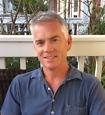
Sean Kinch grew up in Austin and attended Stanford. He earned a Ph.D. from the University of Texas. He now teaches English at Montgomery Bell Academy in Nashville.

